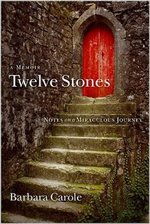Book review co-authored by Randy Radic, author of the forthcoming United Blood Nation: The untold story of the East Coast Bloods, and Senior Editor at http://prisoneducation.com.
Twelve Stones
By Barbara Carole
•Hardcover: 320 pages
•Publisher: Regal
•Language: English
•ISBN-10: 0830746064
ASIN: B0035G06JG
In the Old Testament, specifically in Exodus 28:30, reference is made to the Urim and Thummim, which God ordered included in the breastplate of the High Priest. No one knows for sure precisely what the Urim and Thummim were. Translated from Hebrew, it means "lights and perfections," but most commentators assert that Urim and Thummim refer to gems or stones attached to the breastplate. And that somehow, the Urim and Thummim were used to relay God's answers to the people's questions.
Another passage in the Old Testament relates the story of Joshua ben-Nun, whom most readers know simply as Joshua, who was Moses' executive officer and right-hand man. After the miraculous parting of the Red Sea, Joshua used 12 stones to build a memorial to God. When it was completed, Joshua said, "I pile my stones one upon the other to remember and to honor what God had done for me, how he took a mess and made something beautiful of it."
In both passages, the common denominator is 12. In numerology, 12 represents that which is completed, that which forms a whole, or plenitude. Indeed, 12 is prominent throughout the Bible. And in all, 12 stones, one for each tribe of Israel, were set in the breastplate.
Barbara Carole plays on this theme in her memoir Twelve Stones, with the book having been divided into 12 chapters. Its use is hardly coincidental, as Twelve Stones is a spiritual memoir, the story of a Jewish girl who comes to Christianity. The path she took to arrive at her destination is akin to that of Dorothy on the Yellow Brick road, full of twists and turns and traps and witches and flying monkeys. What we call "Life."
On the not-so-much-fun-side of things, Ms. Carole's life included teenage pregnancy, abortion, and a failed marriage. But on the positive-side, she lived in Paris and worked with the famous undersea explorer Jacques Cousteau. Through it all, the good and the bad, something was ever-present, gently pressing the girl, the young lady, and ultimately, the woman ever in the same direction.
That something was, in fact, someone: God. According to Ms. Carole, "with his exquisite sense of irony, He brought me, in my fortieth year, to something truly different: He brought me to helplessness." Reminding me of the Apostle Paul who said, "When I am weak, then I am strong." In other words, both Ms. Carole and the great Apostle arrived at the point where they felt utterly helpless, and at that point, God became their only recourse. There was no one else to turn to.
But Twelve Stones is not a story of how, through determination and sheer rigid will, Ms. Carole conquered Life and made it subservient to her. It's not a tale of self-actualization. Nor is it an example of spiritual mugging; she refrains from attempting to convert the unconverted. Rather it is a sublimely personal story of a woman who comes to a singular, irrevocable conclusion: She is not God. She is, in fact, helpless. She is a creature that is dependent upon God.
Ms. Carole tells her story using the first person singular, which adds a tone of familiarity to the rendering of her account. For Twelve Stones is an intimate story, a story in which the narrator reveals her most secret thoughts, along with her humiliating failures and her wondrous triumphs. And she does so without succumbing to self-pity or climbing the edifice of arrogance. That's not to say that she divests herself of emotion. She doesn't; her tale is chock-full of emotion. Only she doesn't use those emotional aspects of the story to manipulate the emotions of her readers. Instead of bleeding all over the pages, she allows readers the opportunity to hold her hand and accompany her on her journey.
As the journey progresses, it feels as though something happens on every page. This, in turn, translates into a complex sequence of events that could be overwhelming, but isn't. Ms. Carole avoids this literary sinkhole by recognizing where she is in the storytelling process. And because she knows where she is, so too does the reader. She develops the reader's interest and investment in her character -- herself -- by avoiding self-indulgence. That is, she relates the story as it happened without embellishment or exaggeration. Thus, the story is believable, which means the reader buys in to what is happening.
Thankfully, Ms. Carole eschews experimenting with language or punctuation. She sticks with what she knows best: storytelling. And, since there is a mystical element to her account -- the unseen, gentle hand of God -- the story becomes much more than a simple narrative. It takes on an ethereal quality, where the reader finds himself looking through divine sunglasses; the reader sees God working behind the scenes even when Ms. Carole does not.
If pressed to compare Ms. Carole's literary style to another writer, the only writer that comes to mind is Taylor Caldwell, who wrote wonderfully of God's undetected movements in the lives of humans.
Twelve Stones is a delicate yet grand memoir. The unique tale of how a Jew came to Jesus.

